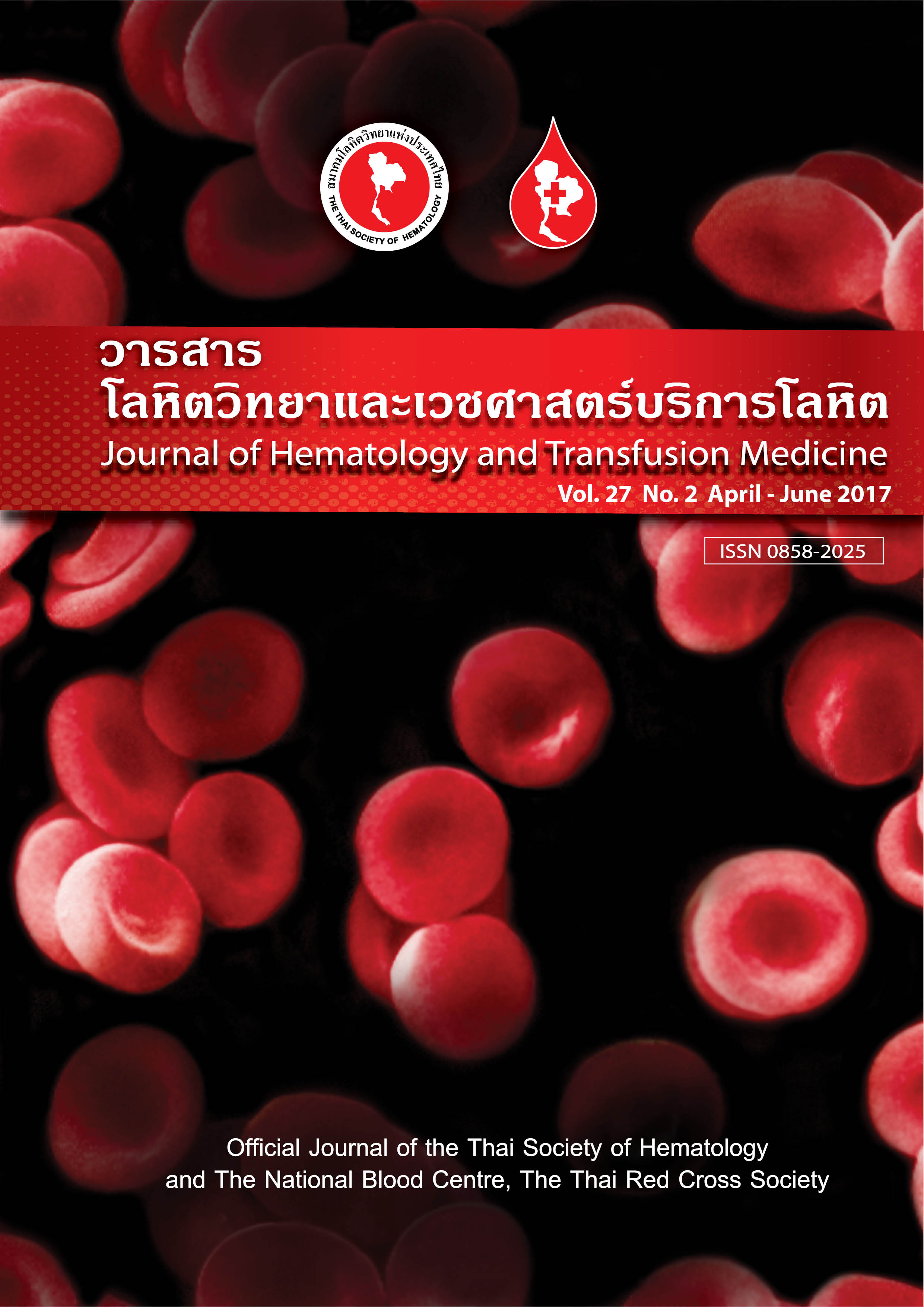การศึกษาชนิด CD36 (Naka antigen) ในตัวอย่างผู้บริจาคเกล็ดเลือดของศูนย์บริการโลหิตแห่งชาติ สภากาชาดไทย
Keywords:
CD36, Naka antigen, Thai blood donorsAbstract
บทคัดย่อ
CD36 หรือ Naka หรือ GPIV เป็นไกลโคโปรตีนบนเกล็ดเลือดและเซลล์อื่นๆ เช่น โมโนไซต์ และ endothelial cells จัดเป็น class B scavenger receptor คนที่เป็น CD36 deficiency (Nakanegative) สามารถสร้าง anti-Naka เมื่อได้รับเลือด หรือตั้งครรภ์ ก่อให้เกิดปัญหาทางคลินิก โดยเฉพาะคนที่เป็น CD36 deficiency type I วัตถุประสงค์ การศึกษานี้ได้ทำการตรวจฟีโนไทป์ของ CD36 (Naka) ในผู้บริจาคเกล็ดเลือดของศูนย์บริการโลหิตแห่งชาติ สภากาชาดไทย เพื่อใช้เป็นข้อมูลเบื้องต้นในการศึกษาความสำคัญทางคลินิก วิธีการศึกษา ได้ดำเนินตรวจหา CD36 บนเกล็ดเลือดจำนวน 598 ตัวอย่าง และบนโมโนไซต์จำนวน 36 ตัวอย่าง เป็นผู้บริจาคที่ให้ผล CD36 บนเกล็ดเลือด negative จำนวน 6 ตัวอย่าง และ positive 30 ตัวอย่าง โดยตัวอย่างทุกรายทำการตรวจฟีโนไทป์ด้วย flow cytometry ผลการศึกษา จากการศึกษาตรวจหา CD36 บนเกล็ดเลือดพบว่าเป็น CD36 positive (Naka positive) จำนวน 588 ตัวอย่าง (98.33%) และเป็น CD36 deficiency (Naka negative) จำนวน 10 ตัวอย่าง (1.67%) และผลการตรวจหา CD36 บนโมโนไซต์ของตัวอย่างที่ให้ผล CD36 deficiency จำนวน 6 ตัวอย่างพบให้ผล positive จำนวน 5 ตัวอย่าง เป็น CD36 deficiency type II และให้ผล negative จำนวน 1 ตัวอย่าง เป็น CD36 deficiency type I จากการศึกษานี้บ่งบอกได้ว่าแอนติเจน Naka อาจก่อให้เกิดปัญหาทางคลินิกในคนไทยได้
Abstract:
CD36 or Nakaor GPIV is a glycoprotein on platelet membrane and other cells such as monocytes and endothelial cells. CD36 is working as a class B scavenger receptor. CD36 deficiency (Nakanegative) persons can produce anti-Nakawhen they receive blood transfusion or during pregnancy, especially CD36 deficiency type I. Objective: To study CD36 (Naka) phenotype in platelet apheresis donors of the National Blood Centre, Thai Red Cross Society in order to be used as a preliminary data in its clinical significance. Methods: This research studied CD 36 on 598 platelet samples and 36 monocyte samples including 6 samples with CD36 negative on platelets and another 30 samples with CD36 positive on platelets obtained from platelet apheresis donors. All samples were phenotyped by flow cytometry. Results: CD36 positive (Nakapositive) was found in 588 samples (98.33%) while CD36 deficiency (Nakanegative) was found in 6 samples (1.67 %). CD36 deficiency was found in 6 monocyte samples; CD36 deficiency type II was found in 5 samples and CD36 deficiency type I was found in 1 sample. This study indicates that Naka antigen may cause clinical problems in Thai population.



